Iranian Journal of Psychiatry and Behavioral Sciences
VerifiedAdded on 2022/08/31
|9
|2298
|16
AI Summary
Contribute Materials
Your contribution can guide someone’s learning journey. Share your
documents today.
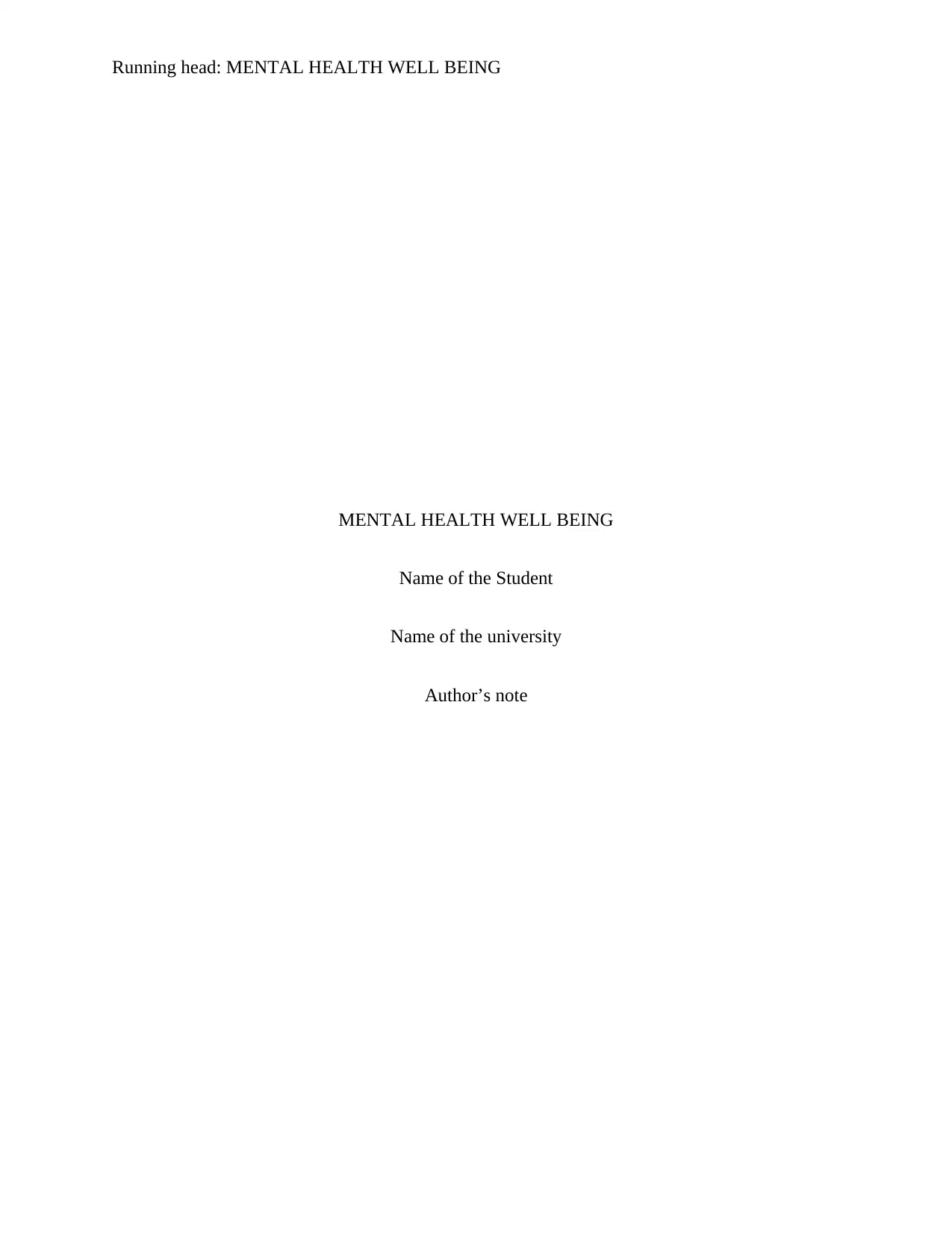
Running head: MENTAL HEALTH WELL BEING
MENTAL HEALTH WELL BEING
Name of the Student
Name of the university
Author’s note
MENTAL HEALTH WELL BEING
Name of the Student
Name of the university
Author’s note
Secure Best Marks with AI Grader
Need help grading? Try our AI Grader for instant feedback on your assignments.
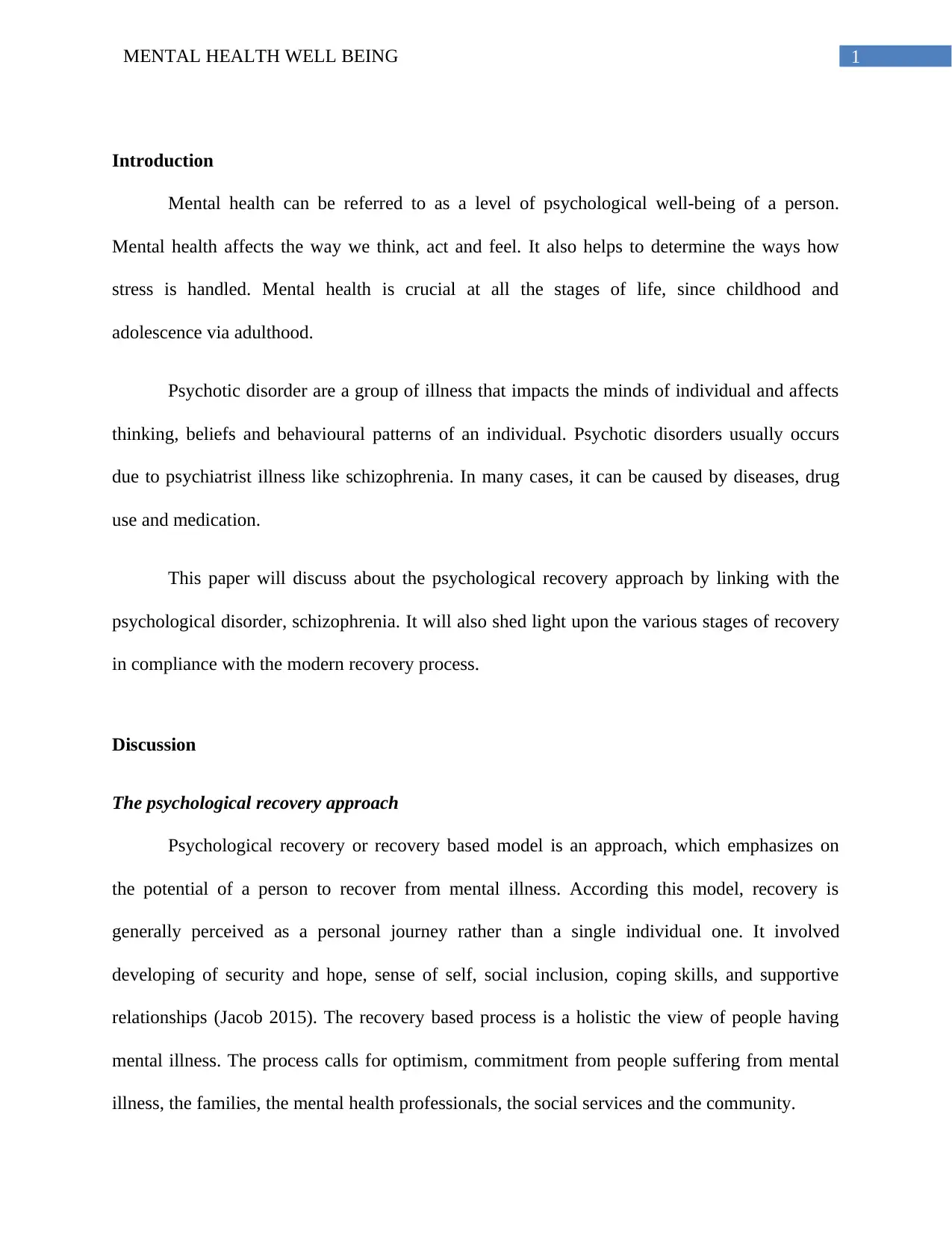
1MENTAL HEALTH WELL BEING
Introduction
Mental health can be referred to as a level of psychological well-being of a person.
Mental health affects the way we think, act and feel. It also helps to determine the ways how
stress is handled. Mental health is crucial at all the stages of life, since childhood and
adolescence via adulthood.
Psychotic disorder are a group of illness that impacts the minds of individual and affects
thinking, beliefs and behavioural patterns of an individual. Psychotic disorders usually occurs
due to psychiatrist illness like schizophrenia. In many cases, it can be caused by diseases, drug
use and medication.
This paper will discuss about the psychological recovery approach by linking with the
psychological disorder, schizophrenia. It will also shed light upon the various stages of recovery
in compliance with the modern recovery process.
Discussion
The psychological recovery approach
Psychological recovery or recovery based model is an approach, which emphasizes on
the potential of a person to recover from mental illness. According this model, recovery is
generally perceived as a personal journey rather than a single individual one. It involved
developing of security and hope, sense of self, social inclusion, coping skills, and supportive
relationships (Jacob 2015). The recovery based process is a holistic the view of people having
mental illness. The process calls for optimism, commitment from people suffering from mental
illness, the families, the mental health professionals, the social services and the community.
Introduction
Mental health can be referred to as a level of psychological well-being of a person.
Mental health affects the way we think, act and feel. It also helps to determine the ways how
stress is handled. Mental health is crucial at all the stages of life, since childhood and
adolescence via adulthood.
Psychotic disorder are a group of illness that impacts the minds of individual and affects
thinking, beliefs and behavioural patterns of an individual. Psychotic disorders usually occurs
due to psychiatrist illness like schizophrenia. In many cases, it can be caused by diseases, drug
use and medication.
This paper will discuss about the psychological recovery approach by linking with the
psychological disorder, schizophrenia. It will also shed light upon the various stages of recovery
in compliance with the modern recovery process.
Discussion
The psychological recovery approach
Psychological recovery or recovery based model is an approach, which emphasizes on
the potential of a person to recover from mental illness. According this model, recovery is
generally perceived as a personal journey rather than a single individual one. It involved
developing of security and hope, sense of self, social inclusion, coping skills, and supportive
relationships (Jacob 2015). The recovery based process is a holistic the view of people having
mental illness. The process calls for optimism, commitment from people suffering from mental
illness, the families, the mental health professionals, the social services and the community.
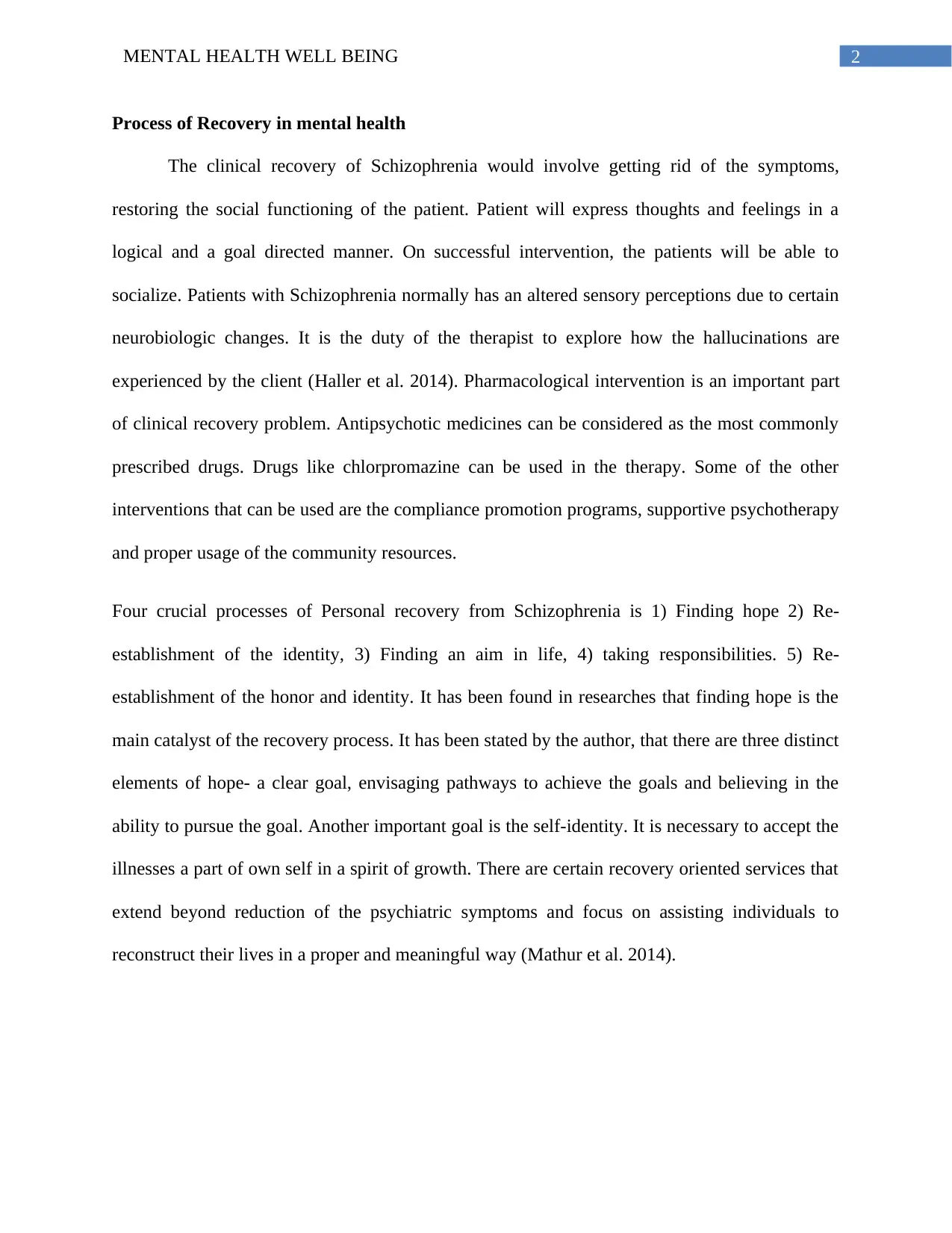
2MENTAL HEALTH WELL BEING
Process of Recovery in mental health
The clinical recovery of Schizophrenia would involve getting rid of the symptoms,
restoring the social functioning of the patient. Patient will express thoughts and feelings in a
logical and a goal directed manner. On successful intervention, the patients will be able to
socialize. Patients with Schizophrenia normally has an altered sensory perceptions due to certain
neurobiologic changes. It is the duty of the therapist to explore how the hallucinations are
experienced by the client (Haller et al. 2014). Pharmacological intervention is an important part
of clinical recovery problem. Antipsychotic medicines can be considered as the most commonly
prescribed drugs. Drugs like chlorpromazine can be used in the therapy. Some of the other
interventions that can be used are the compliance promotion programs, supportive psychotherapy
and proper usage of the community resources.
Four crucial processes of Personal recovery from Schizophrenia is 1) Finding hope 2) Re-
establishment of the identity, 3) Finding an aim in life, 4) taking responsibilities. 5) Re-
establishment of the honor and identity. It has been found in researches that finding hope is the
main catalyst of the recovery process. It has been stated by the author, that there are three distinct
elements of hope- a clear goal, envisaging pathways to achieve the goals and believing in the
ability to pursue the goal. Another important goal is the self-identity. It is necessary to accept the
illnesses a part of own self in a spirit of growth. There are certain recovery oriented services that
extend beyond reduction of the psychiatric symptoms and focus on assisting individuals to
reconstruct their lives in a proper and meaningful way (Mathur et al. 2014).
Process of Recovery in mental health
The clinical recovery of Schizophrenia would involve getting rid of the symptoms,
restoring the social functioning of the patient. Patient will express thoughts and feelings in a
logical and a goal directed manner. On successful intervention, the patients will be able to
socialize. Patients with Schizophrenia normally has an altered sensory perceptions due to certain
neurobiologic changes. It is the duty of the therapist to explore how the hallucinations are
experienced by the client (Haller et al. 2014). Pharmacological intervention is an important part
of clinical recovery problem. Antipsychotic medicines can be considered as the most commonly
prescribed drugs. Drugs like chlorpromazine can be used in the therapy. Some of the other
interventions that can be used are the compliance promotion programs, supportive psychotherapy
and proper usage of the community resources.
Four crucial processes of Personal recovery from Schizophrenia is 1) Finding hope 2) Re-
establishment of the identity, 3) Finding an aim in life, 4) taking responsibilities. 5) Re-
establishment of the honor and identity. It has been found in researches that finding hope is the
main catalyst of the recovery process. It has been stated by the author, that there are three distinct
elements of hope- a clear goal, envisaging pathways to achieve the goals and believing in the
ability to pursue the goal. Another important goal is the self-identity. It is necessary to accept the
illnesses a part of own self in a spirit of growth. There are certain recovery oriented services that
extend beyond reduction of the psychiatric symptoms and focus on assisting individuals to
reconstruct their lives in a proper and meaningful way (Mathur et al. 2014).
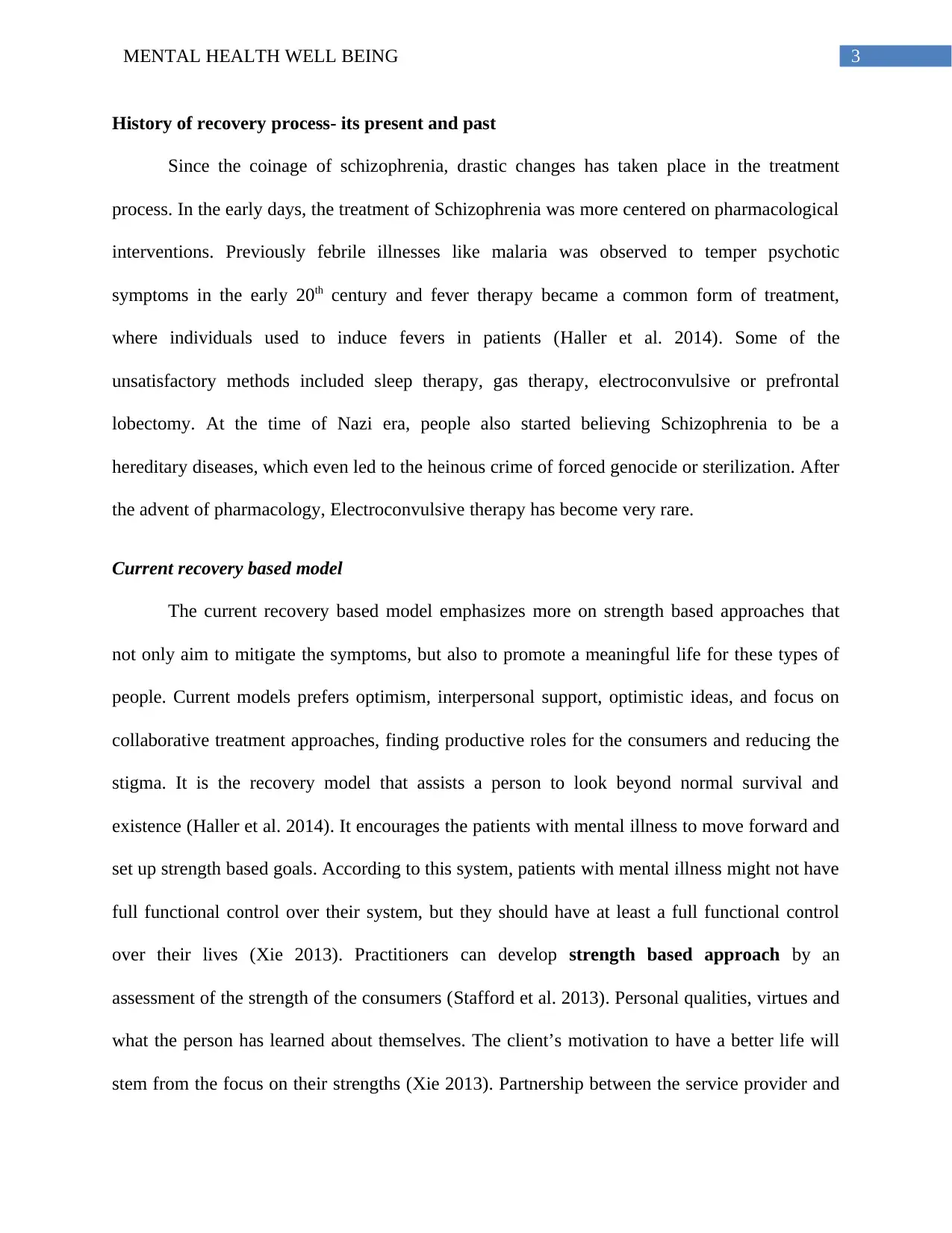
3MENTAL HEALTH WELL BEING
History of recovery process- its present and past
Since the coinage of schizophrenia, drastic changes has taken place in the treatment
process. In the early days, the treatment of Schizophrenia was more centered on pharmacological
interventions. Previously febrile illnesses like malaria was observed to temper psychotic
symptoms in the early 20th century and fever therapy became a common form of treatment,
where individuals used to induce fevers in patients (Haller et al. 2014). Some of the
unsatisfactory methods included sleep therapy, gas therapy, electroconvulsive or prefrontal
lobectomy. At the time of Nazi era, people also started believing Schizophrenia to be a
hereditary diseases, which even led to the heinous crime of forced genocide or sterilization. After
the advent of pharmacology, Electroconvulsive therapy has become very rare.
Current recovery based model
The current recovery based model emphasizes more on strength based approaches that
not only aim to mitigate the symptoms, but also to promote a meaningful life for these types of
people. Current models prefers optimism, interpersonal support, optimistic ideas, and focus on
collaborative treatment approaches, finding productive roles for the consumers and reducing the
stigma. It is the recovery model that assists a person to look beyond normal survival and
existence (Haller et al. 2014). It encourages the patients with mental illness to move forward and
set up strength based goals. According to this system, patients with mental illness might not have
full functional control over their system, but they should have at least a full functional control
over their lives (Xie 2013). Practitioners can develop strength based approach by an
assessment of the strength of the consumers (Stafford et al. 2013). Personal qualities, virtues and
what the person has learned about themselves. The client’s motivation to have a better life will
stem from the focus on their strengths (Xie 2013). Partnership between the service provider and
History of recovery process- its present and past
Since the coinage of schizophrenia, drastic changes has taken place in the treatment
process. In the early days, the treatment of Schizophrenia was more centered on pharmacological
interventions. Previously febrile illnesses like malaria was observed to temper psychotic
symptoms in the early 20th century and fever therapy became a common form of treatment,
where individuals used to induce fevers in patients (Haller et al. 2014). Some of the
unsatisfactory methods included sleep therapy, gas therapy, electroconvulsive or prefrontal
lobectomy. At the time of Nazi era, people also started believing Schizophrenia to be a
hereditary diseases, which even led to the heinous crime of forced genocide or sterilization. After
the advent of pharmacology, Electroconvulsive therapy has become very rare.
Current recovery based model
The current recovery based model emphasizes more on strength based approaches that
not only aim to mitigate the symptoms, but also to promote a meaningful life for these types of
people. Current models prefers optimism, interpersonal support, optimistic ideas, and focus on
collaborative treatment approaches, finding productive roles for the consumers and reducing the
stigma. It is the recovery model that assists a person to look beyond normal survival and
existence (Haller et al. 2014). It encourages the patients with mental illness to move forward and
set up strength based goals. According to this system, patients with mental illness might not have
full functional control over their system, but they should have at least a full functional control
over their lives (Xie 2013). Practitioners can develop strength based approach by an
assessment of the strength of the consumers (Stafford et al. 2013). Personal qualities, virtues and
what the person has learned about themselves. The client’s motivation to have a better life will
stem from the focus on their strengths (Xie 2013). Partnership between the service provider and
Secure Best Marks with AI Grader
Need help grading? Try our AI Grader for instant feedback on your assignments.
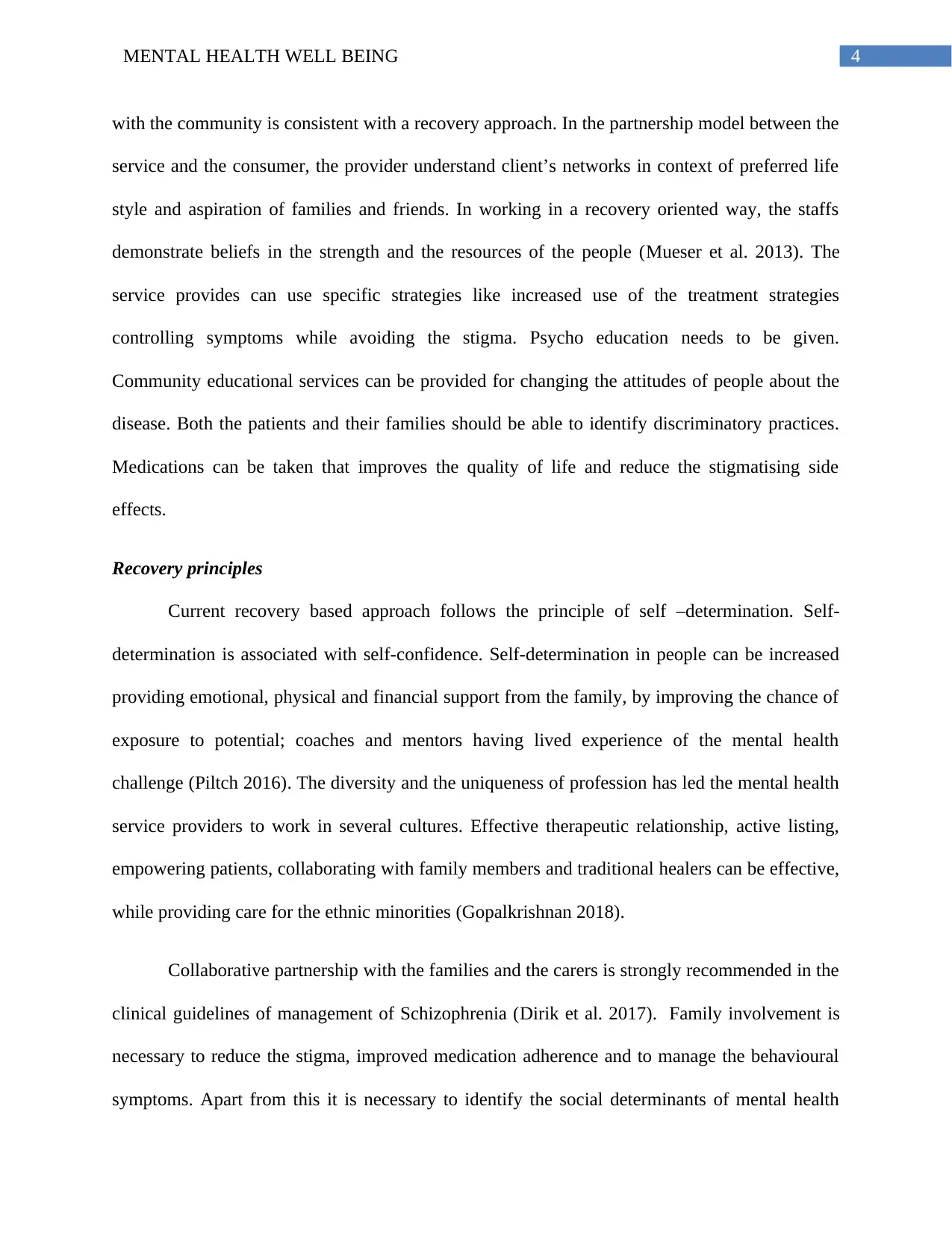
4MENTAL HEALTH WELL BEING
with the community is consistent with a recovery approach. In the partnership model between the
service and the consumer, the provider understand client’s networks in context of preferred life
style and aspiration of families and friends. In working in a recovery oriented way, the staffs
demonstrate beliefs in the strength and the resources of the people (Mueser et al. 2013). The
service provides can use specific strategies like increased use of the treatment strategies
controlling symptoms while avoiding the stigma. Psycho education needs to be given.
Community educational services can be provided for changing the attitudes of people about the
disease. Both the patients and their families should be able to identify discriminatory practices.
Medications can be taken that improves the quality of life and reduce the stigmatising side
effects.
Recovery principles
Current recovery based approach follows the principle of self –determination. Self-
determination is associated with self-confidence. Self-determination in people can be increased
providing emotional, physical and financial support from the family, by improving the chance of
exposure to potential; coaches and mentors having lived experience of the mental health
challenge (Piltch 2016). The diversity and the uniqueness of profession has led the mental health
service providers to work in several cultures. Effective therapeutic relationship, active listing,
empowering patients, collaborating with family members and traditional healers can be effective,
while providing care for the ethnic minorities (Gopalkrishnan 2018).
Collaborative partnership with the families and the carers is strongly recommended in the
clinical guidelines of management of Schizophrenia (Dirik et al. 2017). Family involvement is
necessary to reduce the stigma, improved medication adherence and to manage the behavioural
symptoms. Apart from this it is necessary to identify the social determinants of mental health
with the community is consistent with a recovery approach. In the partnership model between the
service and the consumer, the provider understand client’s networks in context of preferred life
style and aspiration of families and friends. In working in a recovery oriented way, the staffs
demonstrate beliefs in the strength and the resources of the people (Mueser et al. 2013). The
service provides can use specific strategies like increased use of the treatment strategies
controlling symptoms while avoiding the stigma. Psycho education needs to be given.
Community educational services can be provided for changing the attitudes of people about the
disease. Both the patients and their families should be able to identify discriminatory practices.
Medications can be taken that improves the quality of life and reduce the stigmatising side
effects.
Recovery principles
Current recovery based approach follows the principle of self –determination. Self-
determination is associated with self-confidence. Self-determination in people can be increased
providing emotional, physical and financial support from the family, by improving the chance of
exposure to potential; coaches and mentors having lived experience of the mental health
challenge (Piltch 2016). The diversity and the uniqueness of profession has led the mental health
service providers to work in several cultures. Effective therapeutic relationship, active listing,
empowering patients, collaborating with family members and traditional healers can be effective,
while providing care for the ethnic minorities (Gopalkrishnan 2018).
Collaborative partnership with the families and the carers is strongly recommended in the
clinical guidelines of management of Schizophrenia (Dirik et al. 2017). Family involvement is
necessary to reduce the stigma, improved medication adherence and to manage the behavioural
symptoms. Apart from this it is necessary to identify the social determinants of mental health
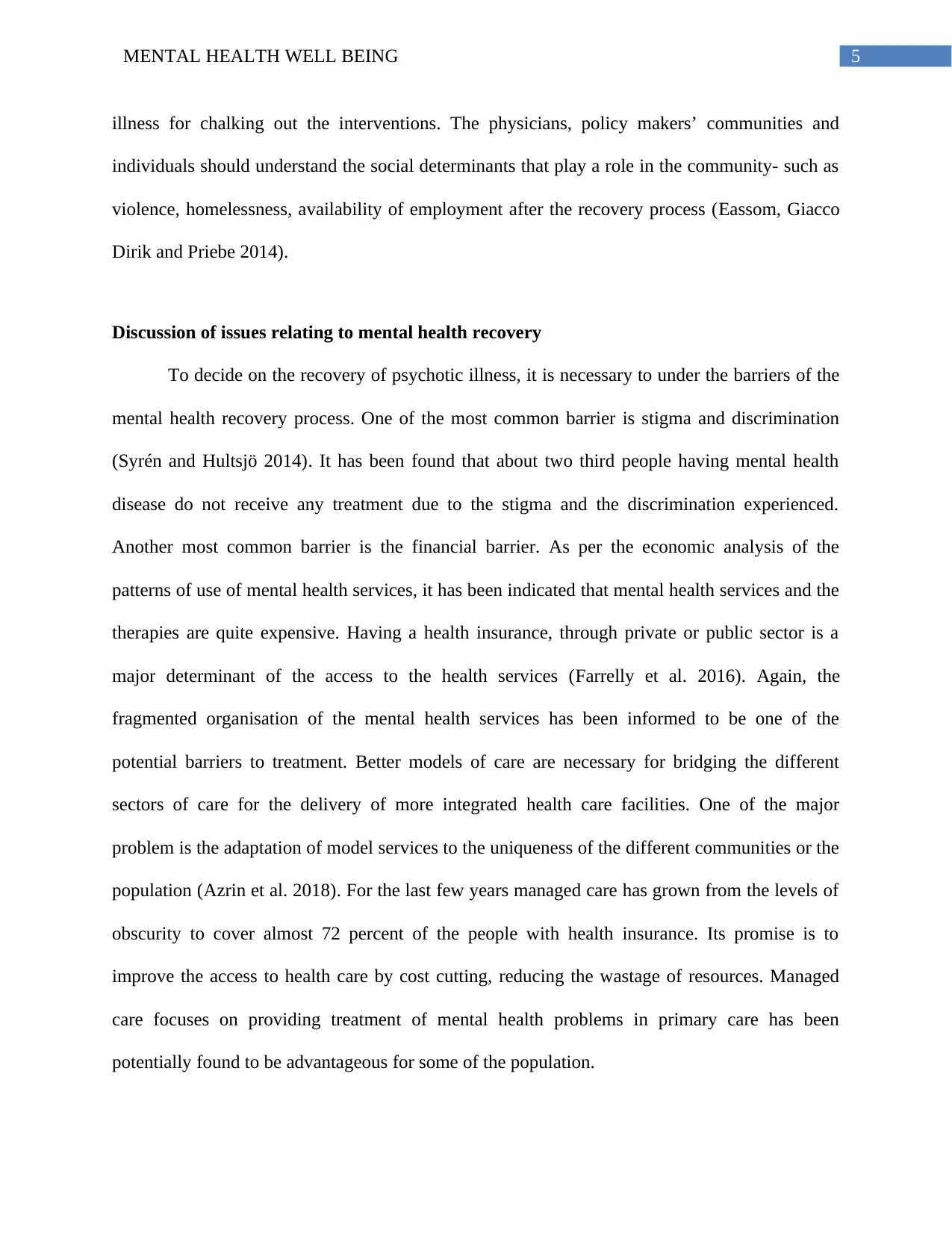
5MENTAL HEALTH WELL BEING
illness for chalking out the interventions. The physicians, policy makers’ communities and
individuals should understand the social determinants that play a role in the community- such as
violence, homelessness, availability of employment after the recovery process (Eassom, Giacco
Dirik and Priebe 2014).
Discussion of issues relating to mental health recovery
To decide on the recovery of psychotic illness, it is necessary to under the barriers of the
mental health recovery process. One of the most common barrier is stigma and discrimination
(Syrén and Hultsjö 2014). It has been found that about two third people having mental health
disease do not receive any treatment due to the stigma and the discrimination experienced.
Another most common barrier is the financial barrier. As per the economic analysis of the
patterns of use of mental health services, it has been indicated that mental health services and the
therapies are quite expensive. Having a health insurance, through private or public sector is a
major determinant of the access to the health services (Farrelly et al. 2016). Again, the
fragmented organisation of the mental health services has been informed to be one of the
potential barriers to treatment. Better models of care are necessary for bridging the different
sectors of care for the delivery of more integrated health care facilities. One of the major
problem is the adaptation of model services to the uniqueness of the different communities or the
population (Azrin et al. 2018). For the last few years managed care has grown from the levels of
obscurity to cover almost 72 percent of the people with health insurance. Its promise is to
improve the access to health care by cost cutting, reducing the wastage of resources. Managed
care focuses on providing treatment of mental health problems in primary care has been
potentially found to be advantageous for some of the population.
illness for chalking out the interventions. The physicians, policy makers’ communities and
individuals should understand the social determinants that play a role in the community- such as
violence, homelessness, availability of employment after the recovery process (Eassom, Giacco
Dirik and Priebe 2014).
Discussion of issues relating to mental health recovery
To decide on the recovery of psychotic illness, it is necessary to under the barriers of the
mental health recovery process. One of the most common barrier is stigma and discrimination
(Syrén and Hultsjö 2014). It has been found that about two third people having mental health
disease do not receive any treatment due to the stigma and the discrimination experienced.
Another most common barrier is the financial barrier. As per the economic analysis of the
patterns of use of mental health services, it has been indicated that mental health services and the
therapies are quite expensive. Having a health insurance, through private or public sector is a
major determinant of the access to the health services (Farrelly et al. 2016). Again, the
fragmented organisation of the mental health services has been informed to be one of the
potential barriers to treatment. Better models of care are necessary for bridging the different
sectors of care for the delivery of more integrated health care facilities. One of the major
problem is the adaptation of model services to the uniqueness of the different communities or the
population (Azrin et al. 2018). For the last few years managed care has grown from the levels of
obscurity to cover almost 72 percent of the people with health insurance. Its promise is to
improve the access to health care by cost cutting, reducing the wastage of resources. Managed
care focuses on providing treatment of mental health problems in primary care has been
potentially found to be advantageous for some of the population.
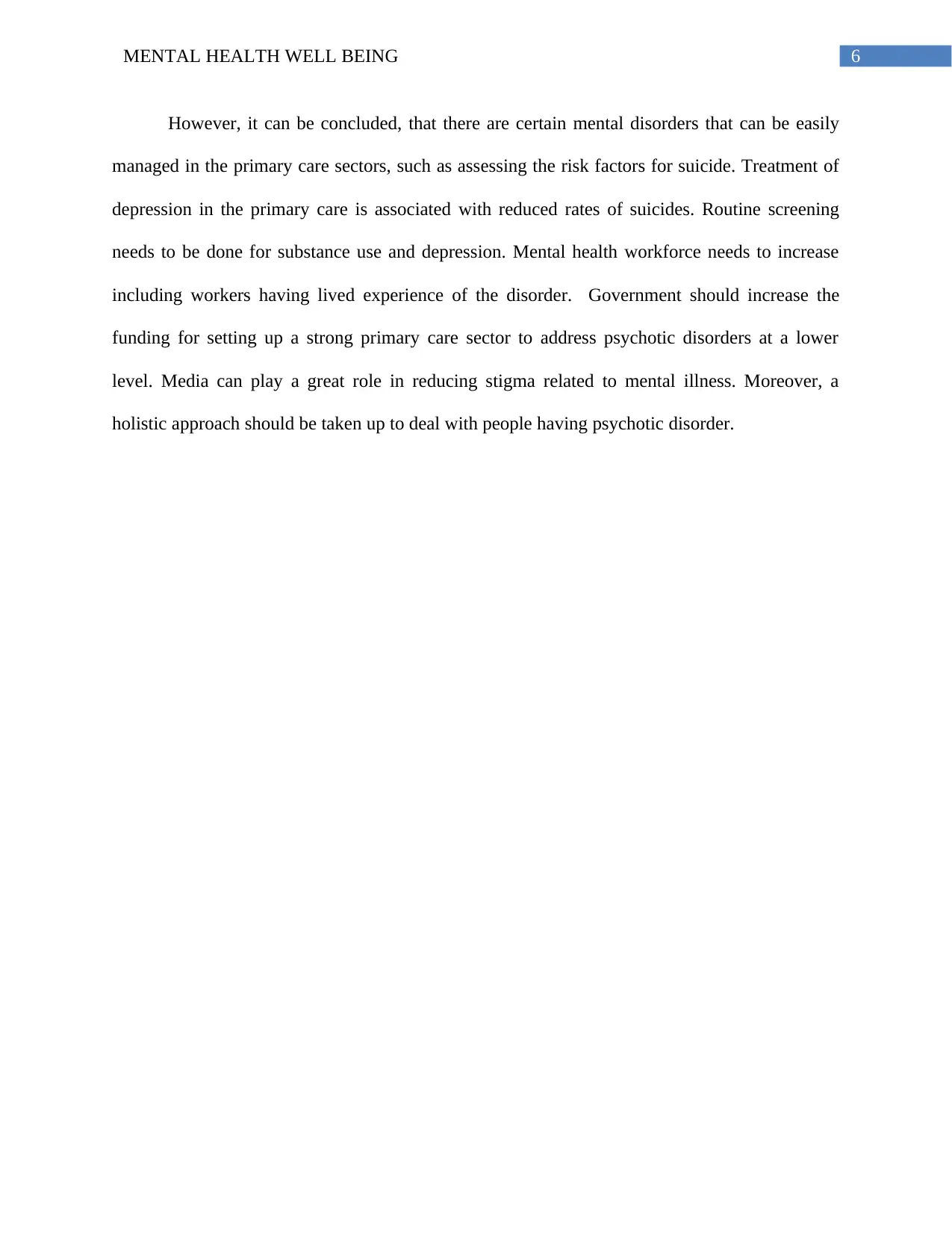
6MENTAL HEALTH WELL BEING
However, it can be concluded, that there are certain mental disorders that can be easily
managed in the primary care sectors, such as assessing the risk factors for suicide. Treatment of
depression in the primary care is associated with reduced rates of suicides. Routine screening
needs to be done for substance use and depression. Mental health workforce needs to increase
including workers having lived experience of the disorder. Government should increase the
funding for setting up a strong primary care sector to address psychotic disorders at a lower
level. Media can play a great role in reducing stigma related to mental illness. Moreover, a
holistic approach should be taken up to deal with people having psychotic disorder.
However, it can be concluded, that there are certain mental disorders that can be easily
managed in the primary care sectors, such as assessing the risk factors for suicide. Treatment of
depression in the primary care is associated with reduced rates of suicides. Routine screening
needs to be done for substance use and depression. Mental health workforce needs to increase
including workers having lived experience of the disorder. Government should increase the
funding for setting up a strong primary care sector to address psychotic disorders at a lower
level. Media can play a great role in reducing stigma related to mental illness. Moreover, a
holistic approach should be taken up to deal with people having psychotic disorder.
Paraphrase This Document
Need a fresh take? Get an instant paraphrase of this document with our AI Paraphraser
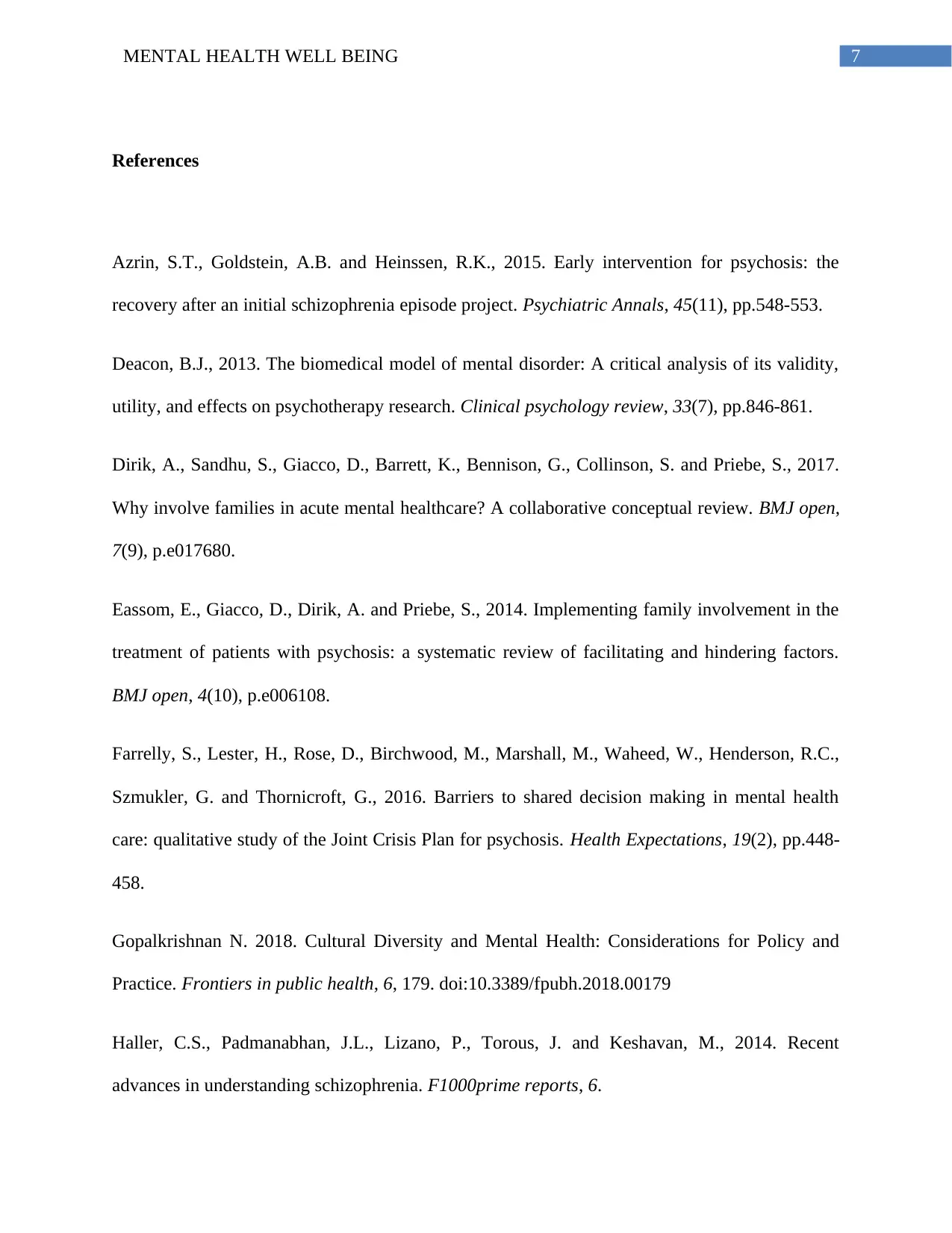
7MENTAL HEALTH WELL BEING
References
Azrin, S.T., Goldstein, A.B. and Heinssen, R.K., 2015. Early intervention for psychosis: the
recovery after an initial schizophrenia episode project. Psychiatric Annals, 45(11), pp.548-553.
Deacon, B.J., 2013. The biomedical model of mental disorder: A critical analysis of its validity,
utility, and effects on psychotherapy research. Clinical psychology review, 33(7), pp.846-861.
Dirik, A., Sandhu, S., Giacco, D., Barrett, K., Bennison, G., Collinson, S. and Priebe, S., 2017.
Why involve families in acute mental healthcare? A collaborative conceptual review. BMJ open,
7(9), p.e017680.
Eassom, E., Giacco, D., Dirik, A. and Priebe, S., 2014. Implementing family involvement in the
treatment of patients with psychosis: a systematic review of facilitating and hindering factors.
BMJ open, 4(10), p.e006108.
Farrelly, S., Lester, H., Rose, D., Birchwood, M., Marshall, M., Waheed, W., Henderson, R.C.,
Szmukler, G. and Thornicroft, G., 2016. Barriers to shared decision making in mental health
care: qualitative study of the Joint Crisis Plan for psychosis. Health Expectations, 19(2), pp.448-
458.
Gopalkrishnan N. 2018. Cultural Diversity and Mental Health: Considerations for Policy and
Practice. Frontiers in public health, 6, 179. doi:10.3389/fpubh.2018.00179
Haller, C.S., Padmanabhan, J.L., Lizano, P., Torous, J. and Keshavan, M., 2014. Recent
advances in understanding schizophrenia. F1000prime reports, 6.
References
Azrin, S.T., Goldstein, A.B. and Heinssen, R.K., 2015. Early intervention for psychosis: the
recovery after an initial schizophrenia episode project. Psychiatric Annals, 45(11), pp.548-553.
Deacon, B.J., 2013. The biomedical model of mental disorder: A critical analysis of its validity,
utility, and effects on psychotherapy research. Clinical psychology review, 33(7), pp.846-861.
Dirik, A., Sandhu, S., Giacco, D., Barrett, K., Bennison, G., Collinson, S. and Priebe, S., 2017.
Why involve families in acute mental healthcare? A collaborative conceptual review. BMJ open,
7(9), p.e017680.
Eassom, E., Giacco, D., Dirik, A. and Priebe, S., 2014. Implementing family involvement in the
treatment of patients with psychosis: a systematic review of facilitating and hindering factors.
BMJ open, 4(10), p.e006108.
Farrelly, S., Lester, H., Rose, D., Birchwood, M., Marshall, M., Waheed, W., Henderson, R.C.,
Szmukler, G. and Thornicroft, G., 2016. Barriers to shared decision making in mental health
care: qualitative study of the Joint Crisis Plan for psychosis. Health Expectations, 19(2), pp.448-
458.
Gopalkrishnan N. 2018. Cultural Diversity and Mental Health: Considerations for Policy and
Practice. Frontiers in public health, 6, 179. doi:10.3389/fpubh.2018.00179
Haller, C.S., Padmanabhan, J.L., Lizano, P., Torous, J. and Keshavan, M., 2014. Recent
advances in understanding schizophrenia. F1000prime reports, 6.
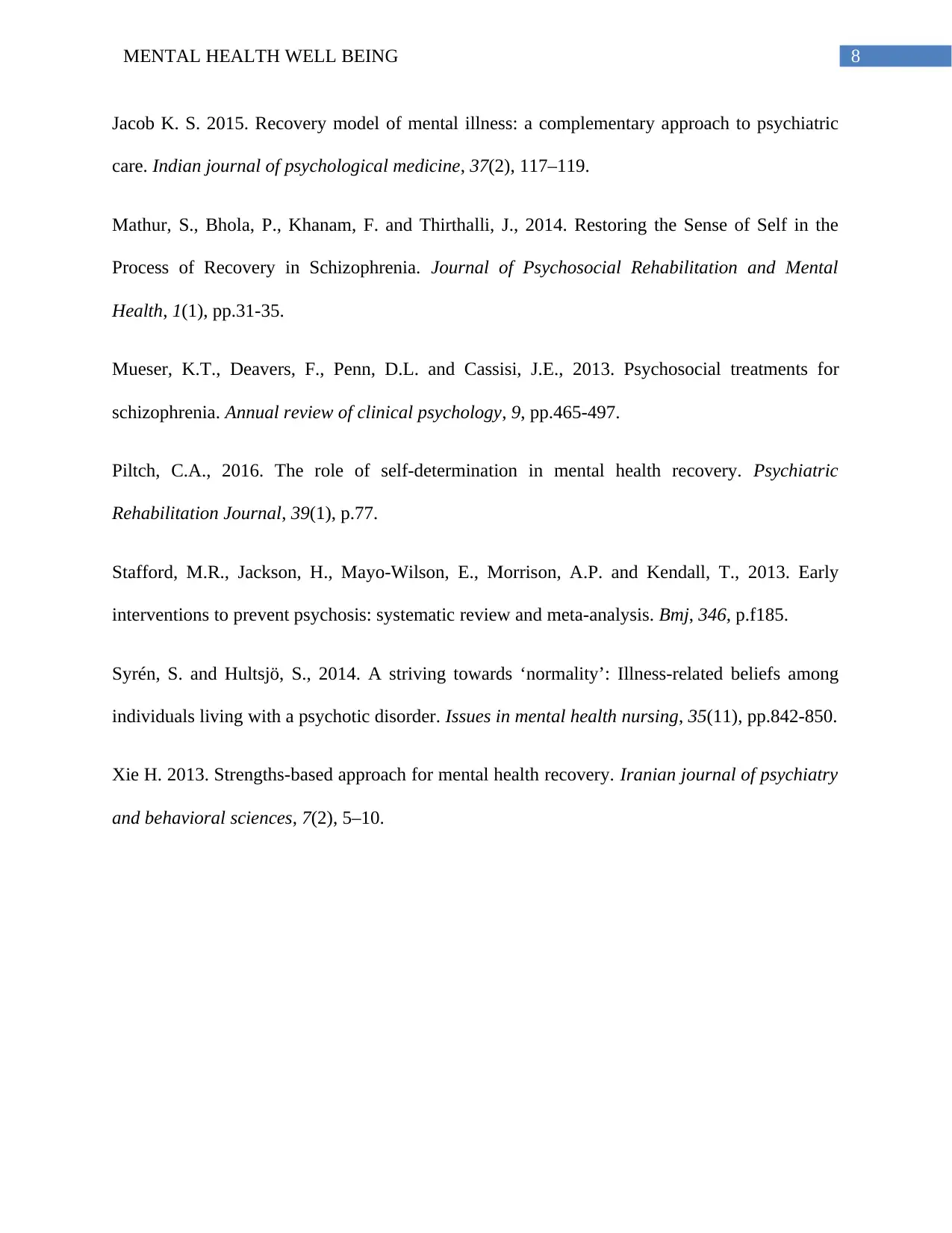
8MENTAL HEALTH WELL BEING
Jacob K. S. 2015. Recovery model of mental illness: a complementary approach to psychiatric
care. Indian journal of psychological medicine, 37(2), 117–119.
Mathur, S., Bhola, P., Khanam, F. and Thirthalli, J., 2014. Restoring the Sense of Self in the
Process of Recovery in Schizophrenia. Journal of Psychosocial Rehabilitation and Mental
Health, 1(1), pp.31-35.
Mueser, K.T., Deavers, F., Penn, D.L. and Cassisi, J.E., 2013. Psychosocial treatments for
schizophrenia. Annual review of clinical psychology, 9, pp.465-497.
Piltch, C.A., 2016. The role of self-determination in mental health recovery. Psychiatric
Rehabilitation Journal, 39(1), p.77.
Stafford, M.R., Jackson, H., Mayo-Wilson, E., Morrison, A.P. and Kendall, T., 2013. Early
interventions to prevent psychosis: systematic review and meta-analysis. Bmj, 346, p.f185.
Syrén, S. and Hultsjö, S., 2014. A striving towards ‘normality’: Illness-related beliefs among
individuals living with a psychotic disorder. Issues in mental health nursing, 35(11), pp.842-850.
Xie H. 2013. Strengths-based approach for mental health recovery. Iranian journal of psychiatry
and behavioral sciences, 7(2), 5–10.
Jacob K. S. 2015. Recovery model of mental illness: a complementary approach to psychiatric
care. Indian journal of psychological medicine, 37(2), 117–119.
Mathur, S., Bhola, P., Khanam, F. and Thirthalli, J., 2014. Restoring the Sense of Self in the
Process of Recovery in Schizophrenia. Journal of Psychosocial Rehabilitation and Mental
Health, 1(1), pp.31-35.
Mueser, K.T., Deavers, F., Penn, D.L. and Cassisi, J.E., 2013. Psychosocial treatments for
schizophrenia. Annual review of clinical psychology, 9, pp.465-497.
Piltch, C.A., 2016. The role of self-determination in mental health recovery. Psychiatric
Rehabilitation Journal, 39(1), p.77.
Stafford, M.R., Jackson, H., Mayo-Wilson, E., Morrison, A.P. and Kendall, T., 2013. Early
interventions to prevent psychosis: systematic review and meta-analysis. Bmj, 346, p.f185.
Syrén, S. and Hultsjö, S., 2014. A striving towards ‘normality’: Illness-related beliefs among
individuals living with a psychotic disorder. Issues in mental health nursing, 35(11), pp.842-850.
Xie H. 2013. Strengths-based approach for mental health recovery. Iranian journal of psychiatry
and behavioral sciences, 7(2), 5–10.
1 out of 9
Related Documents
Your All-in-One AI-Powered Toolkit for Academic Success.
+13062052269
info@desklib.com
Available 24*7 on WhatsApp / Email
![[object Object]](/_next/static/media/star-bottom.7253800d.svg)
Unlock your academic potential
© 2024 | Zucol Services PVT LTD | All rights reserved.





